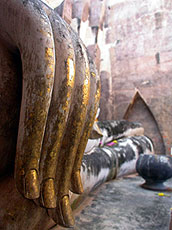Technics and Temporalities:
Two Anthropological Readings of the Vessantara Jatak

Abstract
The Vessantara Jataka (VJ), the last of the biographical past lives of Siddhattha Gotama is told as a tale of of dana, of giving. The paramount virtue of the Pali canon's dana paramitas, or ten perfections, dana presents an ideal concept for a discussion of Buddhist ethics and morality in a world of attachment and desire. In the case of the VJ, we are faced with a circular narrative of excessive giving which results in the forfeiture of one's power (in the form of an elephant), one's children (to the wicked brahmin Jujaka), one's wife (to Indra), and one's soul to a material world which ultimately reintegrates the Prince back into his monastic role as, "heir to the throne of the kingdom," whose country is, "prosperous because he rules righteously."
As a means to consider academic readings of the VJ, I address the intersections and departures between two differring methodologies and anthropological approaches. I situate my theoretical position between these two scholars on questions of ritual and temporality, ethics and narrativity, as a reflection on epistemological methods in Theravāda Buddhist contexts.
The complete paper in PDF format is located here
